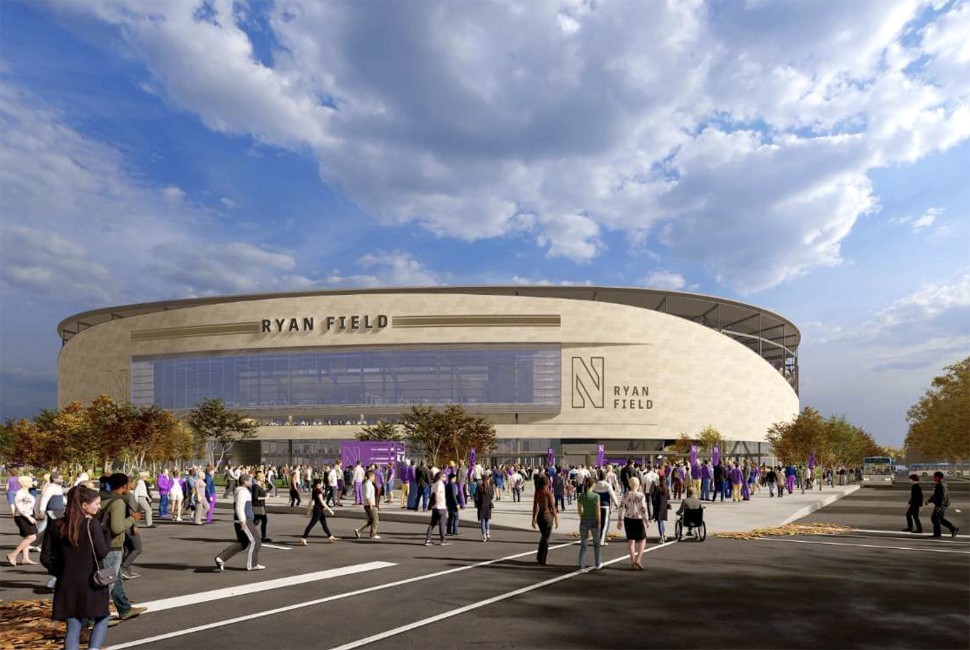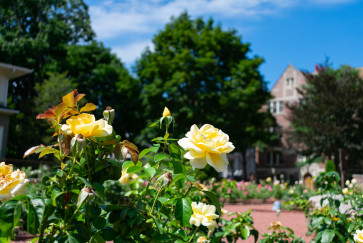The Evanston City Council voted in favor of Northwestern’s proposal to rebuild Ryan Field. The council also approved the rezoning application that would allow six concerts a year and other community-oriented events at the new venue.
The project’s approval comes after extensive dialogue with community members, reflecting Northwestern’s commitment to understanding and addressing the concerns of Evanston residents.
“This decision marks a pivotal moment for Northwestern and the city of Evanston,” said Dave Davis, Northwestern’s senior executive director of Neighborhood and Community Relations. “We’re embarking on a journey that promises not just a state-of-the-art stadium, but also a beacon of cultural and economic vitality. This project is a testament to our shared vision of progress and prosperity.”
The multi-year stadium rebuild stems from a transformative gift to Northwestern from the Patrick G. ’59, ’09 H and Shirley W. Ryan ’61, ’19 H (’97, ’00 P) Family to accelerate breakthroughs in biomedical, economic and business research and help redevelop and modernize Northwestern’s iconic football stadium, improving upon deficiencies in the old stadium and bringing it into the 21st century.
Related: Northwestern releases early design concepts for dynamic new Ryan Field
The new stadium is anticipated to be a catalyst for local economic growth, bringing new jobs, boosting local businesses and creating a vibrant cultural hub in Evanston. Plans call for a rebuilt Ryan Field football stadium that is smaller, more environmentally friendly and accessible as a community venue throughout the year.
Proposed project highlights
Economic growth and job creation: The project is expected to be an economic boon to Evanston by creating new jobs and encouraging inclusive economic growth.
Support for local businesses: Increased visitor traffic and events are projected to raise revenues for local businesses, contributing to the overall economic health of Evanston.
Enhanced cultural experience: Hosting up to six concerts annually, along with other events, will enrich the cultural landscape of Evanston, offering diverse entertainment options for residents and visitors.
Community engagement: The redevelopment plan includes spaces designed for community activities, fostering greater community involvement and engagement.
Environmental sustainability: The project commits to environmentally conscious design and operation, aligning with city and University sustainability goals.
Improved infrastructure: The redevelopment will bring upgraded facilities and infrastructure, enhancing the overall functionality and appeal of the area.
Educational and recreational opportunities: Northwestern plans to leverage the new facilities to provide educational and recreational opportunities for Northwestern students and members of the Evanston community.
This city council decision was the product of hundreds of hours of meetings and collaboration between Northwestern and stakeholders across the city of Evanston, Davis said.
"While we are elated with the Council’s decision, we remain deeply committed to being sensitive and responsive to the concerns raised throughout this process,” Davis said. “We recognize the emotional depth of this issue and extend our sincere gratitude to everyone who shared their perspectives.
“This project has been, and always will be, about more than just a stadium. It’s about enriching our community and creating a legacy of unity and progress. Now, as we move forward, our focus is on healing, uniting and working collaboratively toward the betterment of our beloved Evanston community.”
Northwestern will announce next steps and a timeline at a later date.


